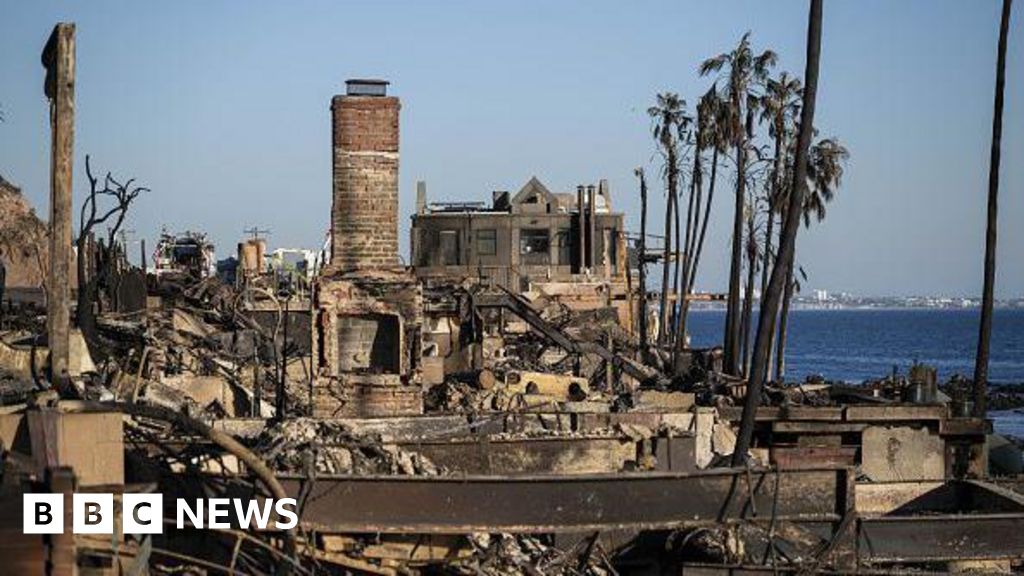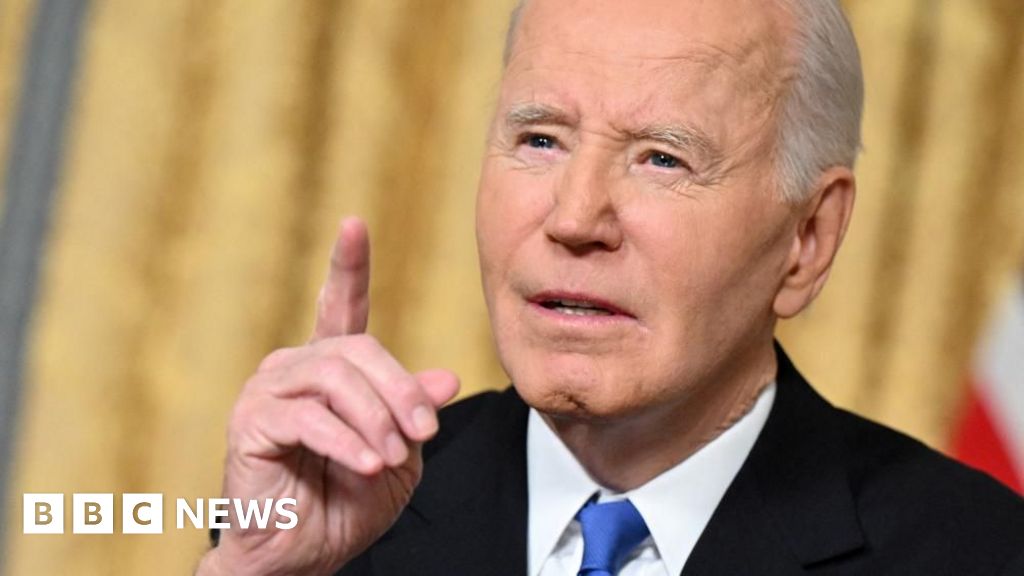ARTICLE AD BOX
Image source, State of Oklahoma
Image caption,Brittney Poolaw was about four months pregnant when she lost her baby
When a 21-year-old Native American woman from Oklahoma was convicted of manslaughter after having a miscarriage, people were outraged. But she was not alone.
Brittney Poolaw was just about four months pregnant when she lost her baby in the hospital in January 2020.
This October, she was convicted and sentenced to four years in prison for the first-degree manslaughter of her unborn son.
How she went from suffering a miscarriage to being jailed for killing her foetus has become the subject of much discussion online and in the press. Some on social media noted that she was convicted during pregnancy loss awareness month in the US. Others compared the case to Margaret Atwood's dystopian novel The Handmaid's Tale.
When she arrived at hospital seeking treatment, Poolaw admitted to using illicit drugs while pregnant.
Later, the medical examiner's report, obtained by the BBC, found traces of methamphetamine in her unborn son's liver and brain.
The examiner did not determine a cause of death for the foetus, noting genetic anomaly, placenta abruption or maternal methamphetamine use could have been contributing factors.
Poolaw's lawyers say they will appeal her conviction. The prosecutor who brought her case to court has declined to comment as the case continues.
Yet Poolaw's story is just the tip of the iceberg, according to Dana Sussman, deputy executive director of the National Association of Pregnant Women (NAPW), a pro-choice advocacy group.
"Britney's case really touched a nerve," Ms Sussman said. "It's not as uncommon as people assumed it was."
The organisation is helping with Poolaw's appeal, and has been tracking arrests and cases of "forcible intervention" against pregnant women in the US.
From 1973-2020, NAPW has recorded 1,600 such cases, with about 1,200 occurring in the last 15 years alone.
Although some involved women who were arrested for things such as falling down, or giving birth at home, the vast majority involved drugs, and women of colour were overrepresented.
The recent explosion of criminal cases is part of a "uniquely American phenomenon" at the crossroads of America's 'War on Drugs' and the personhood movement, said Ms Sussman.
Image source, Getty Images
Image caption,Protesters on both sides held rallies outside the court on Monday
What is a human?
The issue of foetal drug exposure rose to the forefront of cultural debate in the 1980s, when the term "crack baby" began being used to describe the children born to mothers with addiction.
Drug use during pregnancy is associated with many negative outcomes, including an increased risk for miscarriage and stillbirth, but the actual impact of drug use on a foetus varies widely. Studies from the 1980s claiming that children of mothers with cocaine addition suffered extreme developmental defects were later debunked.
Since then, subsequent drug epidemics - from methamphetamine use to the opioid crisis - have kept the issue in the spotlight.
At the same time, several US states have passed laws making it more difficult to obtain an abortion. While people oppose abortion for different reasons, often moral or religious, one part of the argument has come to focus on the notion of personhood.
"The concept of personhood is actually quite simple," said Sarah Quale, president of Personhood Alliance Education, a pro-life organisation.
"Personhood declares that humans are human and that our equality is based on our humanness. Nothing changes the scientific fact that we are biologically human from the very beginning until the very end. Therefore, as humans, we deserve equal protection under the law because we possess inherent, natural rights."
The personhood movement has helped push forward laws that go beyond regulating access to abortion, to extend rights and protections to the foetus as if it were a born citizen of the state.
Personhood Alliance Education also rejects things like medically assisted dying, embryo-destructive research and human trafficking.
While the organisation does not have a stance on whether the law should prosecute mothers who use drugs, Ms Quale said she personally supports measures that "protect pre-born children from the harm that occurs when a mother uses drugs while pregnant".
"But, our legal system must not only consider issues of responsibility and accountability, it must also focus on restoration and recovery for the drug addicted," she added.
Laws that protect - or harm?
Substance use during pregnancy is considered child abuse under civil child-welfare statutes in 23 states, according to the Guttmacher Institute, a pro-choice research institute.
In half of all US states, healthcare professionals are required to report pregnant women suspected of using drugs.
In 2006, Alabama passed a "chemical endangerment" law that made it a felony for a child to be "exposed to, to ingest or inhale, or to have contact with a controlled substance, chemical substance, or drug paraphernalia". An investigation by ProPublica has found that over 500 women were charged in the decade since the law passed.
Tennessee tried to follow suit, passing a similar law in 2014, but the law expired two years later and was not renewed.
In one California county, two women were jailed for allegedly killing their babies after experiencing stillbirths and testing positive for illicit drugs. Murder charges against Chelsea Becker were dropped this year, after she spent a year-and-a-half in jail because she could not make a $2m (£1.48m) bail. Meanwhile, Adora Perez is about of a third of the way through an 11-year sentence for manslaughter after she pleaded guilty to avoid the harsher charge of murder. She is currently trying to appeal.
Both women were prosecuted using what are known as "foetal assault laws", which exist in at least 38 states.
These laws were intended to help punish abusers who harm pregnant women, many spurred by a 2004 federal law passed after the murder of Laci Peterson, who was pregnant, by her husband.
But many of these laws are ambiguous, and leave the doors open for prosecutors to charge women whose behaviours may have contributed to a miscarriage or stillbirth.
Some states have explicit rules about how many weeks old the foetus must be in order to be viable - others do not. Most doctors place viability around 20-24 weeks.
Poolaw was about 16 to 17 weeks pregnant when she miscarried - likely the earliest term pregnant woman to be charged in the US, according to Ms Sussman. About 10-15% of pregnancies at that stage end in miscarriage.
A more draconian future?
If Poolaw had had an abortion instead of a miscarriage, she would not have been charged at all, as abortion is legal in Oklahoma.
But with the Supreme Court set to rule on the legality of a near-total ban on abortions in Texas, and tighter restrictions on abortion in a number of other states, reproductive justice advocates worry that the future could be more draconian.
In countries where abortions are illegal, women have been arrested and charged with murder for having a miscarriage. Local authorities can accuse them of deliberately terminating their pregnancy.
Image source, Getty Images
Image caption,El caso de Manuela se ha convertido en un ícono de los derechos de las mujeres en El Salvador.
One such case, in El Salvador, which has one of the strictest abortion bans in the world, has gone all the way to the Inter-American Court of Human Rights, where a ruling is expected by the end of this year.
Manuela, a 33-year-old woman who went to hospital to seek treatment after a miscarriage, was sentenced to 30 years in prison for homicide. She died in jail in 2010.
Her lawyers say El Salvador's laws, which require doctors to report women suspected of having abortions or face jail themselves, are in violation of international human rights law.
Women in El Salvador say they are being jailed for having miscarriages
At the root of these cases is the idea that women, once they become a mother, should put their foetus first no matter what, said Emma Milne, a legal scholar of gender and crime who teaches at Durham University in the UK.
But the reality is far more complex, Ms Milne said. Often the women are desperate and vulnerable, and need help and support.
"The fact that the state has failed to give them the help and support during their pregnancy and prior to their pregnancy is the fault of the state," she said.
According to a 2012 survey, about 6% of American pregnant women admit to using illicit drugs, while 8.5% drink alcohol and 16% smoke cigarettes.
US medical associations oppose classifying drug use during pregnancy as child abuse and argues that women who have addiction issues should receive treatment, not jail sentences.
"Drug addiction is a disease amenable to treatment rather than a criminal activity," according to the American Medical Association, which represents US doctors.
Giving the unborn equal rights under the law is not simple, said I. Glenn Cohen, an expert on medical ethics and the deputy dean of Harvard Law School.
"No one disputes that foetus are members of the human species. [The question is] whether they are persons (under the law) or not," he said.
Even if the law does grant a foetus personhood, should those personhood rights trump the mother's right to self determination?
"There's a lot here to unpack, but it's almost never unpacked in terms of the politics and how it happens in court," he said.
Women's rights advocates worry it's a "slippery slope" that could lead to pregnant women being stripped of their autonomy.
If a woman can be arrested for harming her foetus because of drug use, what if she has a beer? What if she speeds while driving?
"If we do it for drugs, the question is: what next?" asked Ms Milne.

 3 years ago
96
3 years ago
96








 English (US) ·
English (US) ·